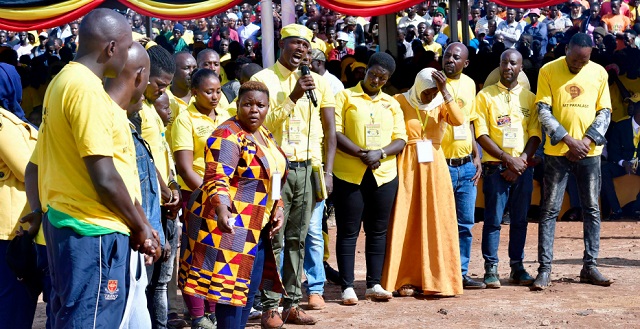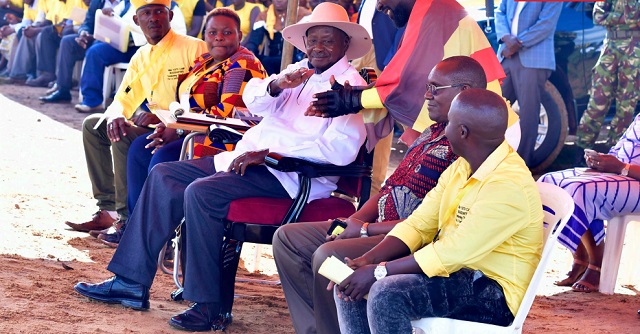
Bobi Wine, Museveni popularity gauge
According to the latest opinion poll by the respected local firm, Research World International titled `Perceptions of Ugandans towards socio-economic and political issues in the country’ and released in April, Bobi Wine was more popular than Museveni in central (33% to 19%) and Kampala (35% to 22%).
On the national stage, Museveni and Bobi Wine were neck-to-neck in urban areas; 29% for Museveni and 26% for Bobi Wine but Museveni was more popular in rural areas at 35% compared to 20% for Bobi Wine. But, according to the opinion poll only 63% potential voters in Bobi Wine’s stronghold of Kampala said they voted in the last election in 2016; the lowest figure. It was followed by central at 75% compared to 84% in the north and western regions.
In age terms, only 63% of those aged between 18 and 29 said they voted compared to 94% of those aged between 50 and 59 years of age.
Up to 80% of those who did not vote said either they did not have time to vote, considered the elections not credible and a waste of time, or had not registered to vote.
Part of the problem appears to be that some of those who did not vote did not have national IDs which is an unofficial precondition for registering to vote. Although overall 90% of respondents to the Research World poll said they have national IDs, Kampala had the highest number of those without national IDs at 25%, followed by central at 13%. This trend is likely to persist in 2021 because, as Buchaman told Museveni bluntly, he has failed to get a national ID just like many ghetto residents. When a journalist from The Observer newspaper asked Buchaman what he would you tell Museveni today, Buchaman was clear.
“I will preach to him (tabira) that the youth want national identity cards (IDs). For them to benefit from development programmes, they will need IDs. By the way, I also don’t have an ID. President must also be informed that some LDUs have a habit of destroying people’s IDs,” he said. The last bit; about LDUs destroying IDs has been a persistent out cry and is now considered a deliberate ploy to disenfranchise young urban ghetto voters. The less of them voting the better for Museveni.
Despite that, at the time Research World did its poll, 32% respondents overall said they would vote Museveni if elections were held the next day. Bobi Wine led the opposition pack with 22% support, Besigye 13%, and DP President General Norbert Mao 2%. A significant 20% were undecided.
The majority of respondents from the opposition parties, 69%, said they want the opposition to have one presidential candidate in the 2021 election and the majority of them, 42% said that candidate should be Bobi Wine. Museveni’s perennial challenger retired Col. Dr. Kizza Besigye trailed Bobi wine at 24% while other opposition leaders got 5% support or less. Bobi Wine had more support in urban areas while Besigye, although lower than Bobi Wine everywhere, scored highly in rural areas.
When asked if Museveni should stand for reelection in 2021, only 38% said he should. Up to 54% said Museveni should not stand. The view that Museveni should not stand was dominant across the country but was strongest in urban areas at 58%. While the view that he should stand was strongest in rural areas at 41%.
When asked which political party they belong to, 64% mention the ruling NRM party, followed by the leading opposition group; FDC at 18%. The surprise on the list was People Power at 10% ahead of established names and parties.

The NRM support was higher in rural areas, 67%, and People Power’s highest showing was in Kampala at 32%. The ruling NRM had more members in Kampala at 39%. Established parties like DP which were traditionally strong in Kampala had 9% membership.
The opinion poll titled: “Perceptions of Ugandans towards socio-economic and political issues in the country”, sampled people from 60 of 110 districts on their opinions and perceptions of the social economic and political aspects.
It found that only 12% of Ugandans aged 18 and above and are potential voters are in formal employment. Up to 25% are either not employed or in part-time employment and 60% self-employed; usually meaning petty trade, hawking, or peasant non-commercial farming in rural areas. The feeling that the country is headed in the wrong direction was high across the board but was highest in urban areas.
Bobi Wine lives and votes in Magere village, Wampeewo parish, Nangabo-Subcounty in Wakiso District which neighbours Kampala. Museveni got 34% at Bobi Wine’s polling station at Magere Freedom square.
If Bobi Wine had voted in his home base of Kamwokya, he would possibly have voted at the Nalunkuma Road polling station in Kamwokya II where the studios of his music company; the Fire Base Crew, are located.
In the last presidential election, Bobi Wine was not running, but Museveni got only 36% of the vote at the Nalunkuma Road Polling station. Up to 61% of votes went to the opposition FDC.
It was part of a sweep that opposition candidates made in the Kampala district; Mubarak Munyagwa in Kawempe South, Michael Kabaziguruka in Nakawa, Ibrahim Kasozi in Makindye East, Kato Lubwama in Rubaga North and Allan Ssewayana, Makindye West.
For now Museveni is courting the ghetto with promises of prosperity and pledges of government support for the artisans, small businesses, petty traders, and saving and credit cooperatives (SACCOS). But the ghetto residents know the routine.
They know that around and during election time, Museveni will deploy the military in force. There could be running battles, teargas, bullets fired and burning barricades blocking roads. The idea is to scare the angry voters away from the voting centres and reduce Museveni’s margin of loss in the national tally.
****
 The Independent Uganda: You get the Truth we Pay the Price
The Independent Uganda: You get the Truth we Pay the Price


